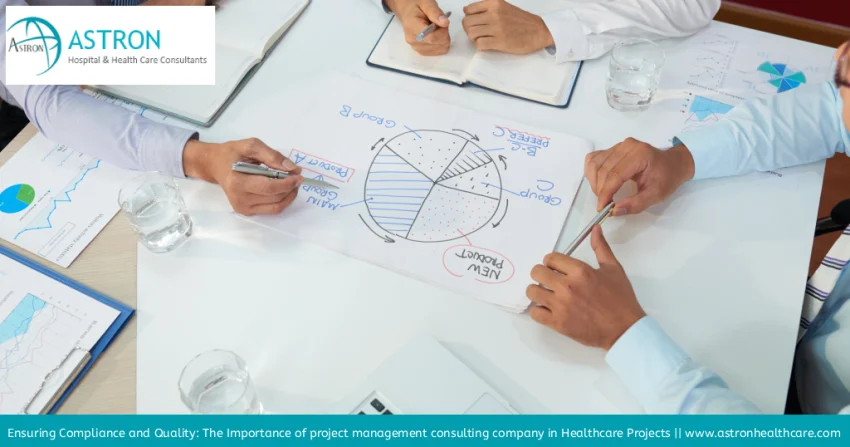The healthcare sector is one of the sectors where all projects, whether building a new hospital, adopting electronic health record (EHR) system, or adding a new clinical service, require accuracy, conformity, and quality in all stages. In comparison to other industries, healthcare projects fall under tough regulatory standards and a lot of scrutiny and therefore, compliance and quality assurance is not only significant but it is obligatory as well. It is in this aspect that a project management consulting company is very essential in ensuring that healthcare organizations operate within the required standards and uphold quality standards and attain their project objectives effectively.
The Unique Nature of Healthcare Projects
Healthcare projects are complex in nature because of the sensitive nature of how they are affected in patient care, safety, as well as data security. Various stakeholders will be involved in every project, such as doctors, administrators, regulatory bodies, and technology providers, all of whom have different expectations. Moreover, the healthcare regulations are continuously changing, and it is necessary to constantly know the national and international standards, including NABH (National Accreditation Board for Hospitals), JCI (Joint Commission International), HIPAA (Health Insurance Portability and Accountability Act) and ISO certifications.
It is not easy to strike a balance between these requirements and keep the cost, quality, and timelines. Project management consulting company instills order and professionalism to overcome this complexity with such compliance and quality being incorporated in all stages of project implementation.
Role of Project Management Consulting Company in Ensuring Compliance
- Knowledge on Regulatory Requirements.
The first step that a project management consulting firm takes is to evaluate the regulatory environment in which the healthcare project is in operation. This involves the recognition of relevant legislation, safety measures, environmental regulations and any compliance requirements specific to the healthcare industry. The consultants develop a compliance roadmap which is in line with local and international regulations so that designed and implemented activities are in line with the necessary standards.
- Standardization of Processes and Documentations.
Compliance is important through standardization. Firms which consult create elaborate project documentation systems, which monitor the progress, ensure quality checks and keep audit trail. Not only are these processes a guarantee of transparency, but it is also more convenient when healthcare organizations are required to prove their compliance in the course of inspections and accreditation audits.
- Risk and Governance management.
The risks of healthcare projects are great as they may include healthcare data breach and safety failures of infrastructure. A project management consulting company will determine these possible risks at a very early stage and will put mitigation measures in place. By employing well-organized governance systems, they make sure that ethical and regulatory considerations are employed in the project decision making process and accountability among teams is upheld.
- Vendor and Contract Compliance.
It is common with most healthcare projects to require third-party vendors, either equipment suppliers, construction partners, or IT service providers. The project management consultants review the vendor credentials, contracts, and their deliverables to make sure they are suitable in terms of meeting the healthcare quality and safety standards. This aids in reduction of delays, non compliance and cost overruns.
Maintaining Quality throughout the Project Lifecycle
Compliance is mandatory, whereas quality determines the success of a healthcare initiative in the long run. The quality assurance in a project management consulting company should not be a one stop point but a process which is part of the overall project life cycle.
- Setting Concrete Quality Metrics.
Consultants develop quality metrics that are applied using industry standards and accreditation standards. These are safety standards, patient experience indicators, and the parameters of operational efficiency. Monitoring these will see the project achieve clinical and operational excellence objectives.
- Regular Audits and Reviews.
Quality audits and performance reviews are done on a regular basis during each milestone. Such reviews will be useful in identifying deviations in good time before they become out of control. The objective view of the consultants will provide the unbiased analysis and the steady improvement.
- Training and Capacity Building.
Even the most developed systems would need competent professionals to work on them. Training of hospital staff, project teams and vendors is usually done by consulting companies to make all aware of compliance rules, quality procedures as well as reporting lines. Such culture of awareness minimizes the number of human errors and enhances the institutional accountability.
The Long-Term Impact of Effective Project Management Consulting
A project management consulting company can not only assist healthcare organizations on how to accomplish projects successfully by enforcing compliance and quality, but it also provides a platform of sustainable excellence. The advantages are not confined to the project completion, as they also involve the enhanced brand credibility, the increased trust of the patients, and the preparedness to the next accreditation.
In addition, consulting engagements that make use of digital tools like project dashboards, analytics, and automated compliance tracking systems make healthcare projects more transparent, data-driven, and efficient. This is a contemporary way of doing things as healthcare institutions concentrate on their primary purpose, providing quality care to patients, yet ensuring that every system surrounding it is of the best quality.
Also Read: How Top Management Consulting Firms Guide Healthcare Facility Development
Conclusion
In the modern changing healthcare environment, neither compliance nor quality is a bargaining point, but they are the foundations of the pillars of trust and sustainability. A project management consulting company makes sure that all healthcare projects are in tandem with such principles by planning, monitoring, and strategy. Having both regulatory experience and operational efficiency, these consultants aid in ensuring that not only the healthcare organizations comply with the standards, but they go beyond them, making each project meaningful to the better and safer healthcare provision.

